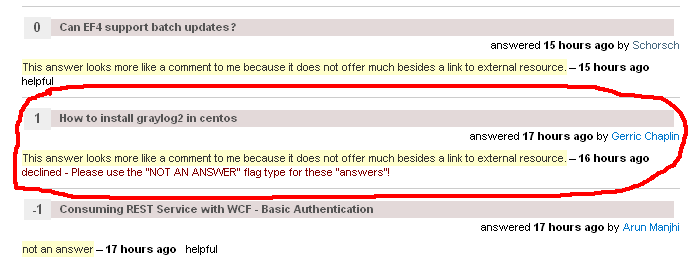flagger's guide to link only answers
Although link-only answers are rather heavily discouraged, a flagger needs to take into account that currently, these carry a certain risk of flag decline. In addition, types of flags that go through 10K tools queue at Stack Overflow carry a risk of being disputed by one of few thousands * 10Kers.
No matter what flag you use, there can always be a feasible explanation that it was wrong. Explanation will of course depend on the flag, for example:
Not an answer
Without additional message, it is difficult to find out what's wrong with flagged post. * Alternatively, one can find a statement that this flag isn't appropriate for link only answers. * Flagger can also be referred to the statement in respective canned message in low quality review queue: "link may answer the question..." *
Very low quality
Link only answers typically don't qualify, as these are very often salvageable through editing. *
Other
These flags bypass 10K review, thus increasing load of moderators. *
For those confused about particularly peculiar decline, there is an option to ask at meta. If the question is spelled in a way that doesn't hurt feelings of meta readers, one can even get some upvotes for asking, but generally one shouldn't expect answers like your flag was right and decline was wrong (see above for examples of how it will likely be handled).
- Side note. In some meta posts or comments you may see moderators suggesting / requiring particular kind flag to be used (or to avoid) for link-only answers. Convenient litmus test in cases like that is to ask author whether this is their personal opinion or a statement that can be quoted in tag wiki (wiki for respective flag or for link-only answers). Tag wiki are quite authoritative reference; anything else, read: use at your own risk.
With above in mind, options available for flagger are about as follows.
Zero effort, no risk
Don't flag link-only answers at all. No gain, no pain.
- Those inclined can also consider editing link-only answers into better shape. That's a no-risk option too, but effort wise it's certainly more than any kind flagging.
Minor effort, some risk
Pick and stick with particular kind flag that feels most appropriate. Learn to live with occasional declines, learn to expect that these will be explained as your fault if you ask at meta.
Substantial effort "in exchange" for less risk
Invest some effort into analyzing the garbage you're flagging and pick a flag that looks like having least chances to be misunderstood. Note this doesn't completely guarantee that flag will be accepted, you only make best effort to avoid decline. That's sort of an art. *
It depends on what the poster tells us. Is it "You can solve the problem by doing this, and this, and that. See this link for reference.", or is it "I had the same problem and found a truly remarkable solution that solves everything. I wrote a marvelous article explaining it all on my blog (full of non-relevant ads). Read all about it!". It isn't the amount of text that might accompany the link, what matters is if there is something relevant to the question. If not, it is really link-only no matter how much other text there is...
It is also worth keeping in mind that if one casts flags in series, there is an additional risk of having series of declines. 1, 2, 3
Related resource deserving dedicated analysis is "Are answers that just contain links elsewhere really “good answers”?" and particularly, a 200+ voted top answer: "links are fantastic, but...". It is sometimes referred to as a definitive discussion on link only answers *.
Besides being generally very enlightening reading, it can be also of a great help if a flagger needs to explain that their intent was to be helpful. It should be noted though that post is "definitive" from moderator perspective, but not from one of a flagger.
- For a moderator, the post can be a major help to resolve misunderstandings that may happen when link-only answers are removed. Moderator can just refer to it and safely expect their decision to be understood and supported by reasonable SE users.
For a flagger, use of the post is rather limited to case like mentioned above (flag intended to be helpful).
Attentive reader will notice that (as of now) the very word "flag" is not mentioned neither in the question, nor in any of the answers, not even in comments.
Post is essentially about what makes link-only answers troublesome, but not about how to flag these. Flagging issues are simply out of scope of discussion. As a result, an attempt to use it to justify particular kind flag would carry a substantial risk of being dismissed and labeled as a matter of a subjective (mis-)interpretation.

